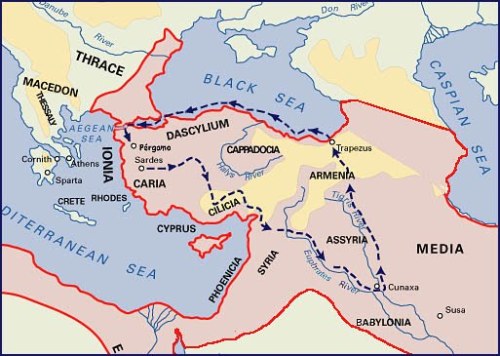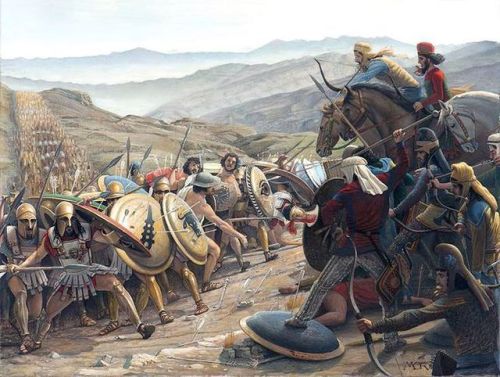peashooter85:Behind Enemy Lines; The Story of the 10,000 Greek Immortals,Its perhaps the worst scena
peashooter85:Behind Enemy Lines; The Story of the 10,000 Greek Immortals,Its perhaps the worst scenario a mercenary can face, you are hired by a client in a faraway country to take part in a bloody civil war. You fight valiantly but despite your best efforts your client is defeated, and as a result you and your mercenary force are trapped in a hostile country, without supplies, with everyone wanting to kill you.In 401 BC the Persian usurper Cyrus the Younger hired an army of 10,400 Greek mercenaries to fight in his attempt to overthrow his brother, King Artaxerxes, for control of the Persian throne. After the Persian Wars Greek hoplites had earned a reputation as fierce and near invincible soldiers. Hence Cyrus believed that an army of Greeks could be a great advantage for his cause. The Greeks were indeed effective, the heavily armed and armored Greek phalanxes were unstoppable. In their first major battle they easily smashed through the Persian lines of light infantry, on the second the Persians ran in panic at the mere sight of the Greeks. However, while the Greeks were successful, the rest of Cyrus’ Persian army was not. Cyrus was defeated and mortally wounded in battle, meanwhile the Greeks returned to their camp to find it had been ransacked and destroyed. The Greeks had been thrust into a mercenary’s worst nightmare; without an employer,without access to food and supplies, and trapped in the heart of a hostile country.At first the Greeks were able to negotiate a truce with the Persians. A Persian governor names Tissaphernes relayed a message from King Artaxerxes; don’t worry, we’re all good, the Greeks could leave in peace, and the Persians would provide guides and supplies for their long journey home. To celebrate the King’s victory, Tissaphernes invited the Greek officers to a grand feast. 200 Greek officers attended the feast, but obviously they should have known better.During the feast the officers were seized and murdered. Only one escaped, returning to the Greek army while clutching his bowels which spilled out of a grievous stomach wound. Greek morale was at an all time low and most of the Greek mercenaries sank to the ground in despair, waiting for the Persians to arrive and kill them.While the Greeks were wallowing in their own misery, a great hero stood up and rallied the desperate mercenaries. A common soldier named Xenophon addressed the Greeks, encouraging the them to rally, that it was time to stop acting like a band of pussies, grow a pair, and if that they were to die, then they should die fighting like mythical heroes. Inspired by Xenophon, the Greeks reformed and reorganized, electing new officers from the common ranks, Xenophon among them.The Greeks formed a square formation, with non-combatants in the center, hoplites surrounding the non-combatants, and skirmishers guarding the front and flanks. The Greeks then began their long march back home. All while under constant attack from the Persians, the Greeks traveled north, following the Tighris river in modern Iraq towards Turkey. As they fought their way north through the empty desert, they survived on whatever supplies they could capture from the enemy, by slaughtering captured Persian horses, and by burning Persian shields and arrows for warmth. One night, the Greek army sheltered in the ruins of Ninevah, capital of the fallen Assyrian Empire which had been destroyed two hundred years before and was once the largest city in the world.The Greeks continued their march through the mountains of Northern Iraq and Eastern Turkey knowing that the Persian Army wouldn’t pursue them through such rugged terrain. Little did they know that they were leaping out of the frying pan directly into the fire. The region was inhabited by a people known as the Carduchians, who were the ancestors of the modern day Kurds. Like the Kurds, they were a fiercely independent people who didn’t take kindly to a large army of foreigners marching through their territory. According to Xenophon, the journey through Northern Iraq and Eastern Turkey was one long continuous battle as the Carduchians constantly ambushed and attacked the Greeks. From the mountains they would sling stones and arrows, or roll large boulders down upon the Greeks. They would fortify mountain passes, forcing the Greeks to conduct costly assaults every mile of the way. They would even dam small creeks, flooding key passes and blocking the Greeks path. Finally, around 399 BC the Greeks traveled through Armenia and made their way to the Black Sea. By then the force of 10,400 Greeks had been whittled down to less than 6,000. From there they were able bum a ride with a fleet of Greek ships to Thrace. For a while they were hired by the Thracians to fight in their civil war, then by the Spartans. Thus they didn’t return home empty handed but with their pockets full of cash. The adventures of the the 10,000 Greek Immortals would be recorded by Xenophon in the book The Anabasis, which became a hit all across Greece. After retiring as a soldier, Xenophon would become a philosopher, studying under Socrates alongside other greats such as Plato and Aristotle. He also became a writer, not only writing The Anabasis, but books on philosophy, history,economics, politics, military theory, and even a treatise on the proper care of dogs. -- source link
Tumblr Blog : peashooter85.tumblr.com

